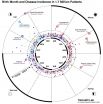(Press-News.org) New York, NY, June 8, 2015 - Professional physician associations consider certain routine tests before elective surgery to be of low value and high cost, and have sought to discourage their utilization. Nonetheless, a new national study by researchers at NYU Langone Medical Center finds that despite these peer-reviewed recommendations, no significant changes have occurred over a 14-year period in the rates of several kinds of these pre-operative tests.
The results are to publish online on June 8, 2015 in JAMA Internal Medicine.
"Our findings suggest that professional guidance aimed at improving quality and reducing waste has had little effect on physician or hospital practice," says Alana E. Sigmund, MD, the lead investigator and an assistant professor in the Department of Medicine at NYU Langone.
In what is believed to be the first study of its kind to look at the long-term national effect of specific professional guidelines across a diverse range of tests and surgery types, the researchers saw no significant decline in use of:
plain radiography, or x-rays done without contrast
hematocrit, or the measurement of the percentage of red blood cells
urinalysis, and
cardiac stress testing
The researchers did, however, see a decline in pre-surgical electrocardiograms.
The costs of such tests may be considerable, given that 30 million Americans undergo surgery each year, and 60 percent of patients undergo ambulatory procedures--which are performed on an outpatient basis.
The study looked at whether two sets of guidelines released concurrently, in 2002, by the American College of Cardiology/American Heart Association and the American Society of Anesthesiologists led to changes in preoperative testing patterns. Both organizations made their recommendations about appropriate testing and treatment strategies to discourage preoperative tests ordered "in absence of a specific clinical indication or purpose."
The NYU Langone researchers analyzed national data from the National Ambulatory Medical Care Survey and the National Hospital Ambulatory Medical Care Survey from 1997 through 2010. These two surveys, conducted annually by the U.S. Centers for Disease Control and Prevention and the National Center for Health Statistics, examine pre-operative visits at office-based physician practices, hospital-based outpatient clinics, and emergency departments in the U.S.
What they discovered is that while overall rates of routine testing declined across several categories over the 14-year period, the declines after accounting for overall changes in physicians' ordering practices were not statistically significant.
The findings are consistent with previous studies, such as those that revealed little change in preoperative cardiac stress testing in Medicare patients, medical consultations for cataract surgery, and testing before hernia repair.
The authors believe the 2002 guidelines may have had little effect for several reasons.
"Evidence suggests physicians are more likely to follow guidelines that add rather than eliminate a test or procedure," says Joseph Ladapo, MD, PhD, an assistant professor in the Department of Population Health at NYU Langone and the study's senior investigator. "In addition, physicians may not have been aware of the recommendations or may not have believed they applied to their patients. They also may have been unduly influenced by reimbursement practices."
The researchers acknowledge that the study was somewhat limited in that it was not able to adjust for surgery type or identify patients who were referred for high-risk surgery. However, they found that the distribution of high-risk surgical procedures during the period after the guideline recommendations saw little change.
"While it's important to ensure patients can safely undergo surgical procedures, many of these procedures are low-risk, and the tests rarely improve patient management," Dr. Ladapo says. "Routine pre-operative testing is part of the culture of many residency training programs, and shifting toward medically-appropriate testing while physicians are still in training may be one way to break the cycle."
INFORMATION:
Conflicts and disclosures: Dr. Ladapo reports serving as a consultant to CardioDx, Inc., a molecular diagnostics company that develops clinical tests focused on coronary artery disease.
This study was supported by grant K23 H116787 to Dr. Ladapo from the National Heart, Lung, and Blood Institute.
Besides Drs. Ladapo and Sigmund, Elizabeth R. Stevens, MPH, of the Department of Population Health and Jeanna D. Blitz, MD, of the Department of Anesthesia, both in NYU School of Medicine, were involved in the study.
About NYU Langone Medical Center
NYU Langone Medical Center, a world-class, patient-centered, integrated academic medical center, is one of the nation's premier centers for excellence in clinical care, biomedical research, and medical education. Located in the heart of Manhattan, NYU Langone is composed of four hospitals--Tisch Hospital, its flagship acute care facility; Rusk Rehabilitation; the Hospital for Joint Diseases, the Medical Center's dedicated inpatient orthopaedic hospital; and Hassenfeld Children's Hospital, a comprehensive pediatric hospital supporting a full array of children's health services across the Medical Center--plus the NYU School of Medicine, which since 1841 has trained thousands of physicians and scientists who have helped to shape the course of medical history. The Medical Center's tri-fold mission to serve, teach, and discover is achieved 365 days a year through the seamless integration of a culture devoted to excellence in patient care, education, and research. For more information, go to http://www.NYULangone.org, and interact with us on Facebook, Twitter, and YouTube.
Both statin and nonstatin cholesterol-lowering drugs were associated with memory loss in the first 30 days after patients started taking the medications when compared with nonusers, but researchers suggest the association may have resulted because patients using the medications may have more contact with their physicians and therefore be more likely to detect any memory loss, according to an article published online by JAMA Internal Medicine.
Acute memory loss associated with the use of statins has been described in case reports and case studies, as well as in some studies, ...
Researchers at University of Helsinki, Finland, and Karolinska Institutet, Sweden, discovered previously uncharacterized mutational patterns in the human regulatory genome, especially in gastrointestinal tract cancers. The study was published in Nature Genetics.
The research led by Academy Professor Lauri Aaltonen and Professor Jussi Taipale, was based on study of more than two hundred whole genomes of colorectal cancer samples. The scientists detected a distinct accumulation of mutations specifically at sites where the proteins CTCF and cohesin bind the DNA.
Both ...
It's a notion that might be pulled from the pages of science-fiction novel - electronic devices that can be injected directly into the brain, or other body parts, and treat everything from neurodegenerative disorders to paralysis.
It sounds unlikely, until you visit Charles Lieber's lab.
A team of international researchers, led by Lieber, the Mark Hyman, Jr. Professor of Chemistry, an international team of researchers developed a method for fabricating nano-scale electronic scaffolds that can be injected via syringe. Once connected to electronic devices, the scaffolds ...
Genes linked to creativity could increase the risk of developing schizophrenia and bipolar disorder, according to new research carried out by researchers at the Institute of Psychiatry, Psychology & Neuroscience (IoPPN) at King's College London.
Previous studies have identified a link between creativity and psychiatric disorders such as bipolar disorder, but it has remained unclear whether this association is due to common genes. Published today in Nature Neuroscience, this new study lends support to the direct influence on creativity of genes found in people with schizophrenia ...
ITHACA, N.Y. - If you want people to choose healthier foods, emphasize the positive, says a new Cornell University study.
Published in the American Journal of Agricultural Economics, the Cornell Food and Brand Lab study showed that when it comes to nutrition education, dos work a lot better than don'ts. This is especially important when determining policies that encourage healthy eating.
Media note: A short video explaining the research, as well as an informational graphic and additional details about this research can be found at, http://foodpsychology.cornell.edu/OP/Hidden_Costs ...
This news release is available in French. A new joint study by researchers at the Montreal Neurological Institute and the Centre for the Study of Democratic Citizenship, both at McGill University, has cast some light on the brain mechanisms that support people's voting decisions. Evidence in the study shows that a part of the brain called the lateral orbitofrontal cortex (LOFC) must function properly if voters are to make choices that combine different sources of information about the candidates. The study found that damage to the LOFC leads people to base their vote ...
A new study gives insight into the mental health of children and teens with Down syndrome and the behavioral medications that medical caregivers sometimes prescribe for them.
The Cincinnati Children's Hospital Medical Center study shows that teens and young adults between the ages of 12 and 21 were significantly more likely to be on psychotropic medications than children 5 to 11 years old. Among children less than 12, the odds of being on a psychotropic medication increased with age for all classes of medications studied. For 12 to 18 year olds, the odds of being on ...
NEW YORK, NY (June 8, 2015) - Columbia University scientists have developed a computational method to investigate the relationship between birth month and disease risk. The researchers used this algorithm to examine New York City medical databases and found 55 diseases that correlated with the season of birth. Overall, the study indicated people born in May had the lowest disease risk, and those born in October the highest. The study was published in the Journal of American Medical Informatics Association.
"This data could help scientists uncover new disease risk factors," ...
PROVIDENCE, R.I. [Brown University] -- Researchers from Brown University are developing a new algorithm to help robots better plan their actions in complex environments. It's designed to help robots be more useful in the real world, but it's being developed with the help of a virtual world -- that of the video game Minecraft.
Basic action planning, while easy for humans, is a frontier of robotics. Part of the problem is that robots don't intuitively ignore objects and actions that are irrelevant to the task at hand. For example, if someone asked you to empty the trashcan ...
Researchers at the University of Illinois at Urbana-Champaign have uncovered physical mechanisms allowing the manipulation of magnetic information with heat. These new phenomena rely on the transport of thermal energy, in contrast to the conventional application of magnetic fields, providing a new, and highly desirable way to manipulate magnetization at the nanoscale.
"In our study, we make use of the fact that a heat current passing through a magnetic material creates a separation of electron spins. This process creates a current of magnetic dipoles that we use to manipulate ...



